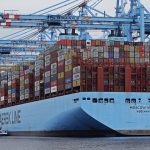Portuguese logistics faced “enormous challenges”
The challenges posed for logistics companies in Portugal by the Covid-19 pandemic, spiralling energy costs, spikes in demand for freight and containers and interrupted supply chains was a key question debated in Lisbon on Tuesday at the 2nd Transatlantic Business Summit.
Organised by the American Chamber of Commerce in Portugal (AmCham) the event which took place at Culturegest highlighted the continuing strong relationship between both the US and the EU which despite supply chain problems and war in Ukraine has not particularly diminished because of challenges posed by China.
On the second panel of the morning entitled ‘Risks and Security Development: Supply Chain, Distribution and Energy’ four companies in Portugal – two of them multinationals — (Rangel, VW Europa and E-REDES) explained the challenges they have faced since early 2020 and how they dealt with or mitigated against them to moderator Jorge Portugal, Director-General of COTEC.
Enormous challenges never seen before
Nuno Rangel, CEO and VP of Rangel Logistics Solutions, which transports goods by land, sea and road, has been particularly exposed to all of the past two year’s events that have affected supply chains in Portugal, Europe and around the world.
Taking a “just in time, just in case” approach to the challenges facing multi-national logistics companies like Rangel, Nuno Rangel said the impacts of Covid-19 and the energy costs crisis on their business had been “huge” and with “changes we had never seen before”.
“We started to feel the effects from February in 2020 with Covid when we began to feel some delays in shipping transport in Europe and then an imbalance between supply and demand in the case of shipping transport,” said Nuno Rangel.
This, he said, had a lot to do with the repositioning of containers to export markets and this created an imbalance between supply and demand and caused prices to soar from as much as US$2,200 to US$16/17,000 with prices reaching a peak in June 2021.
For example, 2021 saw an especially steep increase in global freight rates, reaching a record price of nearly US$ 10,400 in September 2021. In October 2022, the global freight rate index stood at US$3,100.
On the positive side, in terms of container transportation, the market returned to values this month similar or identical to those seen in November 2019, mostly in transports from Asia to Europe and the United States.
As the immediate aftershocks of the COVID-19 pandemic and the war in Ukraine on global trade gradually subside, signs are growing that the finely tuned system of ocean shipping is getting out of the crisis mode.
The massive disruptions to global supply chains, caused mainly by COVID lockdowns in China and having found a vivid expression in ship backlogs at ports, are showing signs of easing. Sea-bound shipping is ready to assume its overwhelming importance of carrying 90% of all transportation across the world.
German business daily Handelsblatt has published data showing that shipping rates have come down to pre-pandemic levels, with a 20-foot container from China to Northern Europe, for example, now costing US$1,479 (€1,420) on average, compared with around US$8,000 at the beginning of 2022. Shipping a container from Shanghai to the US West Coast “is even cheaper than in 2019,” the newspaper reported.
International shipping — not just ships
Nuno Rangel said that as a result of delays in the logistics chain there had been clients that had stopped, others that had continued. “At the beginning we saw a big impact from disruptions in air transport cargo and people are not always aware that a large proportion of goods that are transported by air around the world are carried in the cargo holds of commercial aircraft”, explained Rangel.
And added: “With the advent of Covid all the commercial airlines had to ground their planes and we didn’t have air cargo transport and suddenly we had to resort to chartering planes, but there wasn’t such aggressive demand that there weren’t the charter planes available for us all.
“We used various charters from China to bring ventilators and protection equipment that we needed in Portugal which pushed up the price at the time from US$2.5 to US$16 per kilo, but the realty is that there was so much demand that the more planes that were available, the more we were able to meet that demand”, he said.
Rangel also suffered a huge impact in terms of e-commerce shipments and deliveries that had “never been seen” but we had made huge investments in automisation and because of this we were able to react”, he said.
“Our productive grew a lot and of course people were at home which was an advantage in terms of orders and deliveries”.
Nevertheless, global shipping growth is still expected to have halved in 2022 when the final balance is made due to the economic fallout from the pandemic and the war in Ukraine according to the Institute of Export and International Trade and Research published by the UN Conference on Trade and Development (UNCTAD) which puts expected growth at 1.4% this year, down by 1.8% on 2021.
“The recovery in maritime transport and logistics is now at risk from the war in Ukraine, the continued grip of the pandemic, lingering supply chain constraints, and China’s cooling economy and zero-Covid policy, along with inflationary pressures and the cost-of-living squeeze,” UNCTAD said in the report.
Higher energy costs
Thomas Hegel Gunther, who took over as Diretor-General and Plant Manager at Portugal’s largest car factory Volkswagen Autoeuropa in December, 2021 also said the successive crises over the past two and a half years had affected the company.
“The problems that we have as an industry are not new and we have been dealing with them for just over two years. The risks and concerns we have right now are higher energy costs on the one hand with lots of our processes being energy intensive.
“The other issue is inflation and the imbalance in logistics and supply chain processes worldwide, and shocks in supply and demand occurring at the same time, and if I were to be honest we still have not gone back to a situation of complete balance. (2019)
This, he said, had various negative consequences in various sectors, and not just the automobile sector, but “in our case — and this is the good news — we have learnt from these crises and become more flexible”.
Autoeuropa has both logistics aspects in being local and cross-border aspects being international but how is it reacting to raw materials supply and transport?
“A company like ours is very dependent on the logistics system as we are part of a larger network within the Volkswagen Group with all of our suppliers and logistics services. It was crucial for us to react as quickly as possible to certain situations. One example is that 99% of the cars that we produce here in Portugal are exported. We receive many parts and materials from overseas and keeping this flow uninterrupted is vital for our business”, he said.
As to energy costs, José Ferrari Careto – President of E-REDES, an energy network company which promotes energy transition and which has 6.4 million clients and is also involved in SMART cities projects, said: “We have lived through 10 hallucinating years since the World economic crisis from 2011, the pandemic, climate change and a war of a dimension not seen in Europe for many decades, and it is amazing just how resilient we have proved to be”.
“In this challenging context, the topic of energy is central and I would say that within this the topics of energy transition and renewable energies have also been fundamental and central.”
“We have an important responsibility regarding our role as a facilitator for energy transition and I would even say one of the main challenges we’e facing is seizing this role in the most efficient way possible, which demands a lot from our infrastructure and employees”, he said.
Three quarters of renewable electricity production distributed in Portugal is through its network in the sense that electrical mobility is secured through its electricity charging points networks.
Energy communities are also hooked up to its network and it is significantly changing the way electricity consumption is measured in Portugal with a “very challenging rollout” from a logistics point of view of SMART electricity metres.
José Ferrari Careto has overseeing the installation of 15,000 of these intelligent electricity counters per week, having already installed over 4.6 million, of which 3.7 million communicate directly with the network.
“Our goal is to have 100% of the stock of SMART electricity meters in Portugal” he said. “With a network on this scale there will be an increase in data production at a rate of around every 15 minutes that will allow consumers to take more intelligent decisions that will contribute towards a more efficient society in terms of energy use”, he explained.
“The challenges are huge given these goals, many of these challenges are shared with other industries in other sectors”, he added.
Today technology is synonymous in terms of IT and automation, with drones and HGVs in warehouses and distribution centres, although the sector continues to be focused on people and the lack of people with skills for this new reality in which many enterprises find themselves.
Rangel has been dealing with this challenge of finding talent and the lack of manpower which has had an relevant impact on the logistics company, especially given that the unemployment rate is very low in Portugal.
“This has made recruitment very difficult” admitted Nuno Rangel, both in qualified and non-qualified labour markets, particularly IT engineering, and the company has taken some measures to “mitigate against some these problems”.
“The big impact we have felt is in terms of ongoing operations, and although we have a team with a specific number of people it has been easy to maintain this team. The big problem we have felt over the past 18 months is when we have to open up new operations with new processes (Rangel has recently opened a new logistics operation north of Lisbon employing around 100 people) and finding 100 people is a lot more difficult today than it formerly used to be,” he said.
So much uncertainty
In his address to the summit, Joseph P Quinlan, Managing Director and Chief Market Strategist at US Trust, Bank of America Private Wealth Management and author of the Trans-Atlantic Economy surveys published since 2004, admitted that over the past 20 years “we have never had to deal with so much uncertainty over the economy, trade flows, foreign direct investment, and company profits.
He said that the world was on the cusp of a recession. “There is a global slowdown coming and bearing down on us which will effect the United States, Europe and China. We know it is coming and how we react to it is the key question.”
“I am afraid that the US is becoming more inward looking in terms of how companies go about doing their business. I am all for re-shoring, near-shoring, on-shoring and even allies shoring, but business is being told more and more what to do, how to do it, and where to do it.
“That is not necessarily good for business; businesses are different and set up differently, whether shareholders or stakeholders”, he said
Quinlan pointed out that the War in Ukraine was a huge issue as well, but highlighted the fact that the US is an energy superpower. “The good news is that the transatlantic relationship is strong so we were ready for what happened with Russia and Ukraine from an energy perspective”.
Keeping markets open
Luíz de Mello, Director of the Policy Studies Branch at the Economics Department of the OECD, said that markets had to be kept open in the current geo-political and energy scenario.
“Globalisation and free trade has been an enormous source of wealth, prosperity and efficiency in our economies and we are already seeing the cost of trade coming down as those disruptions in the supply chains that we saw as economies began to open up after the pandemic begin to dissipate.
“We have to bear in mind that further efforts to increase tariffs or distort the trade flows that we have seen in the past would have an economic cost so let us continue to reap the benefits of open markets”, he said.










